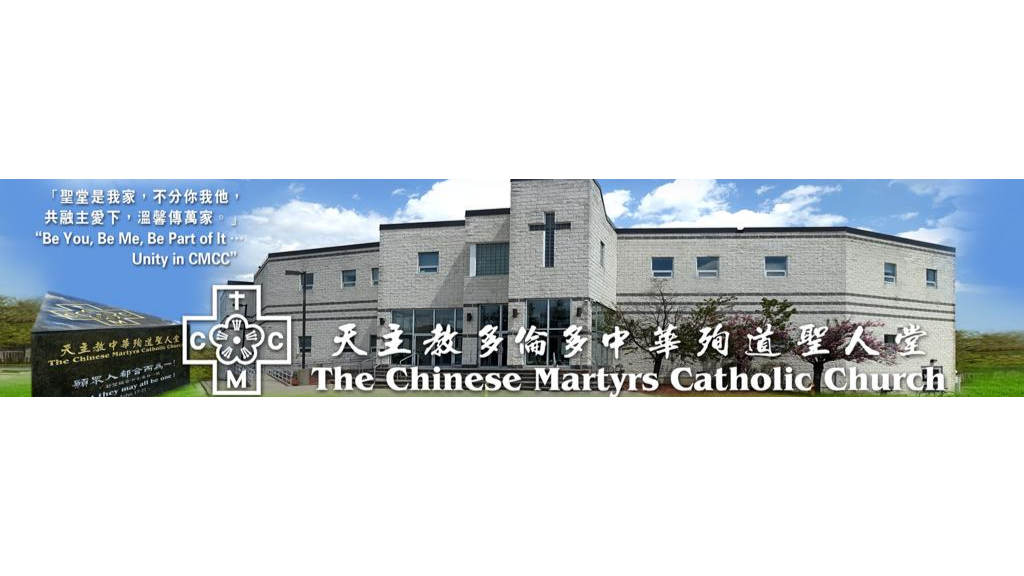- Home
-
Our Community
- CMCC 中華殉道聖人堂
- SJBNCCM 北區華人聖若翰堂
- CSJB 耀漢小兄弟會
- Archdiocese of Toronto
- Catholic Cemeteries
- Volunteering
- Accessibility
- Safe Environment Policy
-
Our Ministries
- Faith Development 信仰培育
- Liturgical Ministries 禮儀組
- Music Ministries 聖詠團
-
Outreach Ministries 外展服務
- The 333rd Markham Scout Group 萬錦第333 童軍旅團
- Families of Love 主寵愛之家
- Legion of Mary-Our Lady of Sheshan Praesidium 聖母軍佘山聖母支團
- Legion of Mary-Queen of Chinese Martyrs Praesidium 聖母軍 - 中華殉道聖人之后支團
- Mandarin Knights of Columbus – Fr. Vincent Lebbe Council 哥伦布骑士会16726雷鸣远神父属会
- Knights of Columbus – Chinese Martyrs Council # 15463 哥倫布騎士會中華殉道聖人屬會
- Walking with You Cancer Caring Group 伴你行癌症病人關顧小組
- Welcoming Team 迎新組
- Parish Support Groups 功能及其他組別 (1)
- Parish Support Groups 功能及其他組別 (2)
- Prayer Groups 祈禱會
- Youth Ministries 青少年 組
- Our Faith
- Parish Life
- Bulletin
- Contact Us
- Search

Upcoming Workshop Explores Some of the Bible’s Most Difficult Questions
Fr. Fred Chung is a faculty member at St. Augustine’s Seminary in Toronto, Ont. On Saturday, October 2, he will host an online Lay Spiritual Formation workshop on “The Soul’s Search for Joy and Meaning,” which will examine the difficult questions raised by the Book of Ecclesiastes. He discusses his workshop below.
1. With all due respect to the Book of Ecclesiastes, it is not one of the most read books in the Bible. What do you think Ecclesiastes offers to those who read it?
I have spoken to many people who agree that Ecclesiastes resonates with them when they are struggling with the deeper questions in life. It may come during a crisis in life, or a period of spiritual purification, or a time of dryness or conversion. The epilogue of Ecclesiastes tells us the sayings of the wise are “like goads.” In other words, they poke at us to move forward, to grow in wisdom and nudge us ultimately towards God.
2. Despite being a more obscure book, some of the lessons from the Book of Ecclesiastes will be familiar to even secular people. What are some of the most well-known verses from Ecclesiastes?
The title of this biblical book may not be on the tip of everyone’s tongue, but it is much better known than you would think. The phrase “vanities of vanities” is familiar to many. And the poem in chapter three about the time for all things is often read out in a variety of occasions: “A time to weep, and a time to laugh; a time to mourn, and a time to dance.” Also, the speaker calls his listeners to seize the moment and enjoy life to the fullest, which is reminiscent of the saying carpe diem: seize the day!
3. Ecclesiastes is attributed to a “Qoheleth.” What can you tell us about this Qoheleth and how his life could be of interest to people today?
The book is like a soliloquy of a certain character who introduces himself as “David’s son, Qoheleth, king in Jerusalem.” It is not a proper name, but more likely a kind of title. Qoheleth may mean “the one who gathers” or “assembles” or “preaches to an assembly.” He recounts a fabulously wealthy and successful life, with all kinds of earthly treasures and building projects. He was also privileged with all the education that wisdom has to offer.
But it was not enough. He needed more, but he could not see any further, because he could only go as far as human reason can take him. I think many people today can relate to him. He gives voice to some of our deeper anxieties about the meaning to our work and life in this passing world.
4. How does the Book of Ecclesiastes help us better understand the rest of the Bible?
I believe it shows in a dramatic fashion why the prophets were sent and why in the fulness of time, Jesus the Messiah came into the world. The Book of Ecclesiastes asks some of the toughest questions, but the answers remain veiled until the coming of Christ, the Word, who “became flesh and dwelt among us.” Jesus is the Bread of Life who gives enduring food, but it is hard to appreciate what he offers, if we do not experience the hunger.
In this workshop I hope to walk through some of the key challenges of Qoheleth, and see how Scripture itself can respond to them. In particular, we will look at a few Psalms as well as the Gospel of John, as a starting point in this search for meaning and joy that Qoheleth hungers for.
5. For those who are interested in learning more about Ecclesiastes, what do they need to know about your workshop?
You do not need an extensive knowledge of the Bible. Just bring your Bible and an open mind and heart. There will be opportunities to discuss some questions.
To learn more and to register for Fr. Fred’s workshop, please click here.
